Guns
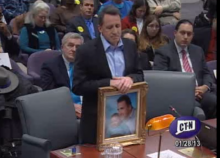
We know we are addicted to something when that behavior damages our relationships with people. When alcohol, drugs, food, gambling, or work is more important than mother, father, husband, wife, child, friend, or neighbor, we know we have a problem. Similarly, we know that we are worshipping an idol when a created thing becomes more important than the Creator, when we put our faith in our fears and a dead thing that cannot love us back becomes the object of our ultimate concern. We know we are worshipping an idol when our devotion fails to cause us to love and to respect our neighbor.
In a Connecticut hearing about gun violence, Neil Heslin — a father whose son died in the mass shooting at the Sandy Hook Elementary School —asked why any one individual citizen needs military-style assault weapons and high-capacity magazines. People in the room answered by quoting the Second Amendment. In this case, the Second Amendment was more important than this father’s pain. Their lack of respect for his pain indicated a deficit of both compassion and love, not only for this grieving father but for a grieving nation.
Let us be clear. The Second Amendment is not holy writ, and a gun is not God. Far too many Americans have made these created things, these inanimate objects more important than the compassion we ought to have for one another. This is fetishism. This is idolatry. This is morally wrong.
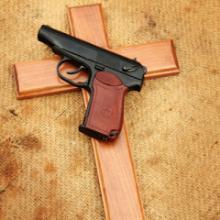
The Arkansas Senate has passed a bill that lifts a ban on carrying concealed weapons in church.
The proposal, which goes to the Arkansas House for consideration, would allow churches to decide which, if any, worshippers with concealed carry permits can bring their firearms inside.
The measure passed 28-4 on Monday Jan. 28, KATV reported.
“Idolatry of guns.” What does that mean, exactly?
It might be hard to admit, but if you think about it, you can see that many groups in the United States see guns as sacred. Guns are not only the solution to our problems, they will save us from evil. Wayne LaPierre, the executive vice president of the National Rifle Association, stated this himself: “The only thing that stops a bad guy with a gun is a good guy with a gun.”
Do we really believe this? If we stop and think about it, we don’t. Our protection does not come from guns, and we do not live in a binary society of good and evil, where the right to hold dangerous weapons can be allocated to people who are entirely virtuous.
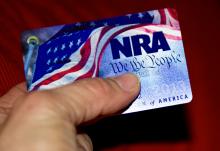
Tuesday was the 84th birthday of Rev. Dr. Martin Luther King, Jr. I don’t know about you, but I miss his words, so I offer a few. King said “people often hate each other because they fear each other, they fear each other because they don’t know each other, they don’t know each other because they cannot communicate, they cannot communicate because they are separated.” I would add to his words: ‘and in that separation they seek guns.’ As an evangelical Christian, I’m going to make this theological.
Wayne LaPierre, executive vice president of the National Rifle Association, said this as his response to the massacre of children at Sandy Hook elementary in Newtown, Conn.: “the only thing that stops a bad guy with a gun is a good guy with a gun.”
That statement is at the heart of the problem of gun violence in America today — not just because it is factually flawed, which of course it is, but also because it is morally mistaken, theologically dangerous, and religiously repugnant.
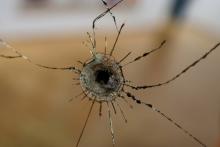
Violence does not equal power.
Martin Luther King, Jr., understood this. Yesterday was King’s 84th birthday. This year the national holiday to honor him will coincide with President Barack Obama’s second inaugural ceremony. And, all of this happens in the wake of one of the worst mass shootings in the nation’s history. One month after the shootings at Sandy Hook Elementary School in Newtown, Conn. — which left 20 children and six adults dead, plus the killer’s mother, found dead in her home — the country grapples with the issue of gun violence. If the country is to come to consensus on the issue, we will have to distinguish between violence and power.
Vice President Joe Biden gave recommendations to the president regarding gun safety on King’s birthday. The questions the media are asking already abound: What recommendations can the president implement through executive order? Can an assault weapons ban pass Congress? Will victims and gun safety advocates be able to persuade Congress to pass meaningful legislation?
There will be varying interpretations of the Second Amendment, and there will be some who will argue that guns are necessary for self-defense. We will have the discussion as to whether or not the gun culture in the United States has taken on religious proportions.
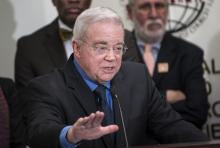
WASHINGTON — Dozens of the nation’s faith leaders said on Tuesday that they’re ready to take on the gun lobby and demanded that politicians take quick and concrete steps to stem gun violence.
At a Capitol Hill press conference and in a letter to Congress, more than 45 clergy and heads of religious groups — representing the spectrum of American religious life — petitioned lawmakers to reinstitute a ban on assault weapons, require background checks on all gun buyers, and make gun trafficking a federal crime.
Organized by the two-year-old coalition Faiths United To Prevent Gun Violence, the signers said the slayings at a Newtown, Conn., elementary school last month had pushed them to redouble their efforts, and created an opportunity to beat back the gun lobby.
The Rev. Jim Wallis, the evangelical who heads the progressive Christian group Sojourners, took on Wayne LaPierre, the outspoken executive vice president of the National Rifle Association, directly.
LaPierre’s statement after Newtown that the “the only thing that stops a bad guy with a gun is a good guy with a gun” is “morally mistaken” and “religiously repugnant,” Wallis said.

WILL THE MASSACRE at Sandy Hook Elementary School touch the nation’s soul or just make headlines for a short time? I think that will be up to us who are parents—to respond as parents.
The brutal shooting of 20 6- and 7-year-old schoolchildren in their own classrooms touches all of us, and as the father of two young boys I’m especially struck by the way it touches parents: from the heartbreak of the parents in Newtown to the tears in the eyes of Barack Obama as he responded—not just as the president but also as the father of two daughters—to the faces of the first responders and reporters who are parents. I have felt the pain and seen the look on the face of every parent I have talked with since this horrendous event occurred. Virtually every mother and father in America has turned their grieving gaze on their own children, realizing how easily this could have happened to them.
The day after the Connecticut massacre, my wife, Joy, and I went to our son Jack’s basketball game. The kids on the court were the same ages as the children who were killed. I kept looking at them one by one, feeling how fragile their lives are.
Our first response to what happened in Newtown must be toward our own children: To be so thankful for the gift and grace they are to us. To be ever more conscious of them and what they need from us. To honor the grief of those mothers and fathers in Connecticut who have so painfully lost their children, we must love and attend to ours in an even deeper way.

What would Jesus do with guns?
Would he own guns? Sell guns? Perform miracles and multiply guns for 5,000 people? Would he use guns? Would he ask his followers and disciples to own guns? I’m no expert on the topic of Jesus and guns but I do know Jesus and for this Jesus who encouraged people to “turn the other cheek” and gave encouragement to be “peacemakers," my guess is that he wouldn’t be a member of NRA.
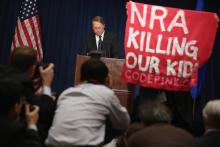
What does the birth of the baby Jesus 2,000 years ago have to offer the violent, troubled world we live in? Or what would Jesus say to the NRA?
I want to suggest — a lot. A whole lot.
Jesus entered the world from a posture of absolute vulnerability — as an unarmed, innocent child during a time of tremendous violence. The Bible speaks of a terrible massacre as Jesus was born, an unspeakable act of violence as King Herod slaughters children throughout the land hoping to kill Jesus (which the church remembers annually as the massacre of the Holy Innocents).
Perhaps the original Christmas was marked more with agony and grief like that in Connecticut than with the glitz and glamour of the shopping malls and Christmas parades. For just as Mary and Joseph celebrated their newborn baby, there were plenty of other moms and dads in utter agony because their kids had just been killed.
From his birth in the manger as a homeless refugee until his brutal execution on the Roman cross, Jesus was very familiar with violence. Emmanuel means “God with us.” Jesus’s coming to earth is all about a God who leaves the comfort of heaven to join the suffering on earth. The fact that Christians throughout the world regularly identify with a victim of violence — and a nonviolent, grace-filled, forgiving victim — is perhaps one of the most fundamentally life-altering and world-changing assumptions of the Christian faith. Or it should be.
So what does that have to do with the NRA? Underneath the rhetoric of the gun-control debate this Christmas is a nagging question: are more guns the solution to our gun problem?
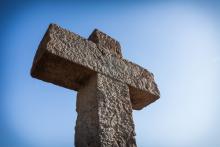
Facebook is breaking my heart.
As I survey the reactions of my fellow evangelicals to the Newtown tragedy, I have seen three strains of thought, each of which absolve us of any responsibility: (1) It would have been different if the principal or a teacher was armed; (2) If Americans care about the slaughter of innocent children, why don't they care more about abortion?; and (3) The secularization of school and society plays a role in these shootings. A few stray comments about mental illness have also floated around vaguely.
Absent from all of this analysis is any consideration of our own failure to do exactly what evangelicals should be all about: Evangelism, in the form of reaching out and giving meaning to lost souls like the loner kid who became the 20-year-old who committed these murders. If a relationship with God is what gives a young life a connection to community, a sense of humility and service, and a devotion to what is good, that is exactly what Adam Lanza needed.
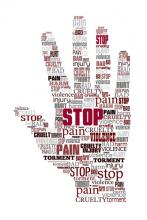
This is not a blog post about gun control. Everything that can possibly be said about that subject, pro or con, has already been said millions of times since Friday. We are talking too much, too soon. In the words of my rabbi, “Judaism teaches that when there is nothing to say we should say nothing….Sometimes only silence gives voice to what has happened."
We Americans should all be sitting shiva.
But when, next week, we rise from our knees and begin working – together, I hope – to reduce the terrible problem of violence in our country, we must realize that our disorder goes much deeper than simply owning too many guns, and that any effective solution will have to go much deeper too.
When they are distressed, some people clean house or do push-ups I collect data. All week I have been amassing numbers and arranging them in rows and columns, trying to shed light on the question: Why are some nations violent while others are not?
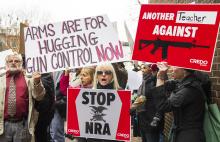
President Obama addressed the nation on Wednesday morning to establish a commission led by Vice President Biden on stronger gun safety laws. Gone was the passion of his address at the interfaith service in Newtown and in place we have back the above-the-fray politician.
However, one point was clear. “If we are going to change things,” he said, “it is going to take a wave of Americans … standing up and saying ‘enough’ on behalf of our kids.”
Will Obama’s address beat the National Rife Association’s messaging strategy?
On Friday, Dec. 21, the NRA will hold its first a press conference after the Newtown, Conn., massacre—and America’s first reasonable conversation on stronger gun laws will come to an end.

In the wake of the recent school shooting tragedy in Connecticut, we will undoubtedly hear the lament, 'America is at the crossroads', as we struggle to contain an increasingly violent society. Sadly, this country left the crossroads some time ago. We have passed the tipping point, and are rapidly descending into the abyss of chaos when it comes to respect for human life.
Well-meaning voices are sounding the alarm that things are different now — innocent children have died in great numbers in Connecticut. This is true, but people are dying every day in towns and cities throughout our nation due to acts of senseless violence. The deaths in Connecticut represent an unspeakable new low, but we have been steadily arriving here for decades.
We will rightly pray for and comfort the families and communities of the victims. We should do no less. There will also be calls for greater gun control. However, we can count on this: we cannot count on our governments to get this epidemic of violence under control. Nor can we retreat to the false comfort of innocuous statements such as, 'Guns don't kill people. People kill people.'

BACK IN 1990, the Presbyterian Church (U.S.A.) issued this warning: "The religious community must ... take seriously the risk of idolatry that could result from an unwarranted fascination with guns, which overlooks or ignores the social consequences of their misuse." Two decades later, about 660,000 more Americans have been killed by guns, with a million more injured.
These figures convince me that what was a risk in 1990 has become our reality today: For too many, guns have become idols. They claim divine status; make promises of safety and security they cannot keep; transform people and neighborhoods; create enemies; and require human sacrifice.
Not all gun owners have permitted their guns to become idols or absolutes. In fact, a recent poll shows most gun owners and NRA members, in contrast to public perception, believe personal freedom and public safety are complementary, not contradictory. But those few who hold the microphone at the NRA (the wealthy manufacturers and the gun zealots who do their bidding) have permitted their fascination for guns to supplant God and God's requirements for human community.
An idol's followers boldly claim divine status for it. Former NRA executive Warren Cassidy was clear when he boasted, "You would get a far better understanding [of the NRA] if you approached us as if you were approaching one of the great religions of the world." Not to be outdone, Charlton Heston, during a speech as NRA president, intoned, "Sacred stuff resides in that wooden stock and blued steel—something that gives the most common man [sic] the most uncommon of freedoms, when ordinary hands can possess such an extraordinary instrument that symbolizes the full measure of human dignity and liberty."

As the winds and the rain of Hurricane Sandy settle down, one bit of the aftermath is going to be another round of conversation about how climate change is affecting our world.
It’s not a conversation you have heard much of in the presidential campaign this year. Climate change is one of a quartet of issues that will have a huge impact on the future of this nation that have gotten short shrift by both President Barack Obama and Gov. Mitt Romney.
Poverty. Guns. . Drones. Climate change.
Bring up any of those issues and watch the candidates make a quick nod of concern and then scamper away from any specifics. Yet those issues will be with us long after Nov. 6, so it is incumbent on those of us in the faith community to be laying the groundwork now for how we will address them in the coming year.
That work has already begun, of course. The challenge is not to let the post-election exhaustion sweep away those concerns like they were potted palms on a pier in the midst of the hurricane.
Across Sacred Fences
More than 50 contributors offer moving, insightful personal essays about interfaith experiences in My Neighbor’s Faith: Stories of Interreligious Encounter, Growth, and Transformation. Edited by Jennifer Howe Peace, Or N. Rose, and Gregory Mobley. Orbis Books
Women Rising
On Oct. 1 and 2, PBS will air the two-part special Half the Sky. Inspired by Nicholas Kristof and Sheryl WuDunn’s best-selling book of the same name, the film follows the authors through 10 countries to meet people challenging extreme gender inequality and the poverty, trafficking, and violence it perpetuates. pbs.org/independentlens
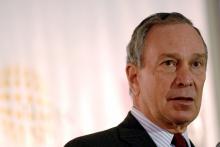
Updated at 11:22: New York City Police Commissioner Raymond Kelly said Jeffrey Johnson, 53, shot and killed a former coworker at Hazan Imports, 41, with a 45-caliber semi-automatic pistol. Johnson had been laid off from the women's apparel company.
Nine other people were wounded or grazed as police exchanged gunfire with the shooter. Mayor Michael Bloomberg said some of the injured may have been victims of accidental police gunfire, and none of them were seriously injured.
"I want to assure people that this had nothing to do with terrorism," Bloomberg said.
Updated at 10:30 a.m.: According to Reuters, two people are dead, including the shooter. At least eight were wounded.
Earlier:
According to the Associated Press, several people have been shot near the Empire State Building in New York City.
From the report:
"City police say three or four civilians have been wounded in the Friday morning shooting and that the shooter is dead. A fire department spokesman says it received a call about the shooting just after at 9 a.m. Friday and that emergency units were on the scene within minutes."
We at Sojourners offer our thoughts and prayers for all those involved in yet another instance of senseless violence.

After the movie theater massacre in Aurora, Colo., and a deadly shooting at a Sikh temple in Oak Creek, Wis., Americans are divided on gun control, and within certain religious groups, attitudes are far from ambivalent.
But on the question of guns in churches, there is actual consensus: A strong majority of Americans don’t want them in the pews, according to a new poll released Wednesday (Aug. 15) by the Public Religion Research Institute conducted in partnership with Religion News Service.
"Although the issue of gun control tends to divide Americans by party, gender, region and race, there is broad agreement among the public that there are some places where concealed weapons should be off limits," said Daniel Cox, PRRI’s research director.
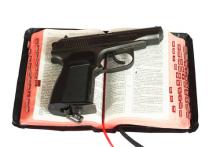
Of all the controversies that have followed in the bloody wake of the July 20 shooting rampage in Aurora, Colo., few have provided such a clarifying insight into the moral tensions and contradictions in American culture than the argument over whether gun control is a religious issue.
The Rev. James Martin, a popular author and Jesuit priest, was among the first to set out the terms of the debate, when he penned a column at America magazine arguing that gun control “is as much of a ‘life issue’ or a ‘pro-life issue’ … as is abortion, euthanasia, or the death penalty (all of which I am against), and programs that provide the poor with the same access to basic human needs as the wealthy.”
Martin’s central point was that abortion opponents spare no effort to try to shut down abortion clinics or to change laws to limit or ban abortions, so clearly believers should be committed to taking practical steps to restrict access to guns.
“Simply praying, ‘God, never let this happen again’ is insufficient for the person who believes that God gave us the intelligence to bring about lasting change,” Martin wrote. “It would be as if one passed a homeless person and said to oneself, ‘God, please help that poor man,’ when all along you could have helped him yourself.”